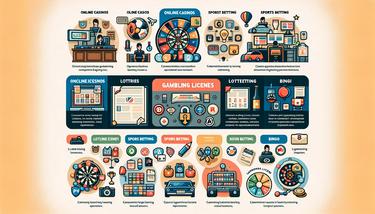What types of gambling licenses exist?
The gambling industry offers various types of licenses, each catering to different forms of gambling activities. The type of license required depends on the nature of the gambling services offered by the operator. This document provides an overview of the common types of gambling licenses available in the industry.
Common Types of Gambling Licenses
- Online Casino License: Permits the operation of online casino games[1] such as slots, roulette, and blackjack.
- Sports Betting[2] License: Authorizes the offering of betting services on various sports events.
- Lottery License: Allows the operation of lottery games, including traditional draw-based games and instant lotteries.
- Bingo License: Specific to the operation of bingo games, both in physical locations and online.
- Poker License: Covers the organization of poker games and tournaments, online and in physical venues.
- B2B (Business-to-Business) License: Intended for software providers and companies offering gambling solutions to licensed operators.
Overview
Gambling licenses are regulatory permits issued by authorized bodies that allow entities to legally offer gambling services. These licenses are categorized based on the type of gambling activity, with specific licenses for different sectors within the gambling industry. Understanding the various types of gambling licenses is crucial for operators to ensure compliance[3] and legal operation.This document outlines the main types of gambling licenses and their respective purposes.
Online Casino Licenses
Online casino licenses allow operators to offer a wide range of casino games over the internet, including slots, table games, and live dealer games. These licenses are among the most sought after, requiring rigorous compliance with standards for fairness, security, and responsible gambling[4].Regulators issuing these licenses often mandate regular audits, game testing, and financial stability[5] checks.
Sports Betting Licenses
Sports betting licenses authorize operators to offer betting services on various sports events. These licenses cover a range of betting types, from traditional fixed-odds betting to in-play betting. Sports betting regulations typically focus on integrity, ensuring events and outcomes are fair and transparent.Operators must also implement measures to combat match-fixing and ensure ethical advertising practices.
Lottery Licenses
Lottery licenses permit the offering of lottery games, including traditional draw-based games, instant lotteries, and scratch cards. Lottery operations are often subject to specific legal frameworks, with a portion of revenues frequently allocated to public or charitable causes.Regulatory requirements for lotteries include player protection[6], fair draw procedures, and transparent distribution of proceeds.
Other Types of Licenses
In addition to the main categories, there are specialized licenses for activities such as bingo, poker, and pari-mutuel betting on horse races. Some jurisdictions also offer comprehensive gambling licenses that cover multiple types of gambling activities under a single regulatory framework[7].Operators must carefully consider the specific requirements and regulatory environments of each type of license when planning their gambling offerings.
Conclusion
The type of gambling license required by an operator depends on the nature of their gambling activities and the markets they intend to serve. Securing the appropriate license is a critical step towards establishing a legal and reputable gambling operation. Compliance with the licensing authority’s regulations ensures integrity, player protection, and the overall sustainability of the gambling sector.
- Casino Games — Games of chance played in casinos, including slot machines, roulette, blackjack, and poker.
- Betting — The act of wagering money on the outcome of events, such as sports matches or horse races.
- Compliance — The act of adhering to legal standards and regulations established by governmental bodies and regulatory agencies, particularly in the context of financial operations and transactions involving cryptocurrencies.
- Responsible Gambling — Initiatives and practices aimed at promoting safe and controlled gambling, preventing gambling addiction, and protecting vulnerable players.
- Financial Stability — A requirement for license applicants to demonstrate sufficient financial resources to cover operational expenses and obligations to players.
- Player Protection — Measures and policies implemented to safeguard the interests and well-being of players, including age verification, self-exclusion programs, and limits on deposits.
- Regulatory Framework — A set of regulations and guidelines established by authorities that govern the operation of financial markets and instruments.
- UK Gambling Commission. (n.d.). Types of licence you may need for your business.
- Malta Gaming Authority (MGA). (n.d.). Types of Licences.

